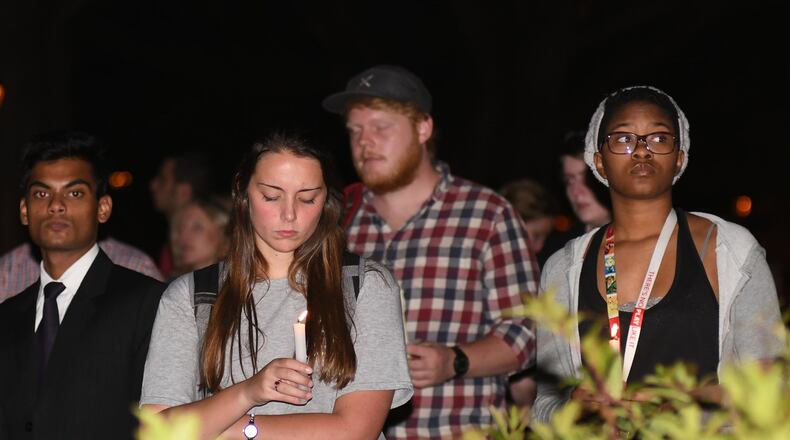Mental illness played a role in a third of the 30 fatal police shootings in Georgia in 2017, according to an Atlanta Journal-Constitution analysis, a finding that comes as law enforcement leaders are grappling with how to lower the number of violent encounters with the public.
Last year, the cases included:
— A South Georgia father of three who in October was walking along a road in Thomasville with a gun and talking irrationally before police shot him.
— A suicidal mother who had a gun and was threatening Cobb County police in November while her 3-year-old daughter was at home.
— A suicidal woman whose distress escalated after police arrived at her suburban Savannah home last month.
The AJC analysis found the total number of fatal police shootings last year matched recent history. The newspaper has been tracking fatal police shootings through its online database of cases since 2010. Over that period, police have shot and killed 243 people in Georgia, an average of 30 deaths a year.
Each year, the incidents involving the mentally ill are numerous enough to stand out. Roughly a quarter of the fatal shootings in Georgia over past eight years involve people who exhibited signs of mental illness, a proportion that matches national figures. Over the past three years, the ratio is about one in three.
In many of the 2017 cases, police were confronting people who were threatening officers in dangerous situations. But police leaders also recognize officers need more training to spot mental illness and defuse confrontations before they escalate to violence.
“They are confronting people that are behaving in a bizarre and threatening fashion,” said LaGrange Police Chief Lou Dekmar. “They don’t always have the tools to recognize the behaviour for what it is and deal with it effectively.”
Mental illness is not a new problem for police on the street. But since the fatal shooting in Ferguson in 2014, police use of force has received intense scrutiny nationwide and plunged communities into crisis.
Gov. Nathan Deal expanded the availability of a 40-hour course on crisis intervention for officers a couple years ago. Previously, a single GBI manager, Debbie Shaw, had been charged with overseeing the training program statewide. About one in five of the more than 50,000 officers across Georgia have completed the program.
“We’re teaching them how to recognize what is occurring with the individual, recognizing signs and symptoms and deescalate the situation,” she said. “They use verbal skills to deescalate the situation or interact with the individual.”
Last fall, the program moved to the Georgia Public Safety Training Center. Shaw now oversees 10 regional coordinators who were added to expand the training. Chris Wigginton, the executive director of the training center, said the goal is to get every officer in the state trained in the expanded Crisis Intervention Team program.
Wigginton said as a trainer he had a motto about making arrests: “I’d rather talk somebody into my back seat versus fight them into the back seat.”
“It’s the same thing with deadly force,” he said. “We’d rather talk that person down from the situation versus having to use force.”
Was force necessary?
There are close to 1,000 fatal police shootings in America each year. Roughly 250 involve people showing signs of mental illness. In Georgia, some of the highest profile cases have involved mentally ill citizens acting erratically. The shooting death in 2010 of Caroline Small in Brunswick occurred after an officer approached the unarmed mother's car in a mall parking lot. She was in the throes of a mental breakdown and led officers on a low speed chase before they shot her multiple times.
A former DeKalb officer, Robert Olsen, is awaiting a murder trial for a March 2015 incident where he shot a unarmed veteran, Anthony Hill, who had been walking naked around his Chamblee apartment complex and exhibiting bizarre behaviour.
Georgia Tech's police force faced criticism last September when one of its officers shot and killed student Scout Schultz who was suicidal and had a knife. The young officer in that case had not undergone the state's 40-hour crisis intervention course and he was not equipped with a Taser.
Civil rights attorney Mawuli Davis has reviewed nearly 50 police shooting cases in recent years. He said the wide latitude given officers means the shootings are often legal, but the facts often raise questions about whether the decision to fire was necessary.
“There has to be a different approach,” he said. “The training has to be more intensive. Just because the law allows deadly force, doesn’t mean you have to use it.”
Georgia collecting more data
One gaping hole in the state’s effort to reduce deadly force incidents has been the lack of data collected by law enforcement agencies about them. Like the rest of the nation, no agency in Georgia had been tracking police shootings. The AJC started tracking cases in 2015 and its database has detailed information on police shootings in Georgia dating back to 2010.
The Georgia Bureau of Investigation is trying to correct the gap. The agency has become the de facto investigative agency across Georgia in most serious use of force incidents, even for some of the larger agencies in metro Atlanta that once conducted their own investigations in use of force cases.
The GBI investigated 126 cases of use of force last year — its most ever — including 97 cases where a firearm was used. Scott Dutton, the deputy director over the GBI’s investigative division, said the change has allowed them to collect the most comprehensive data the agency has ever gathered on police shootings. Agents conducted a mid-year analysis last year and one element jumped out.
“A common theme or thread was how many involved mental health issues,” he said.
He said the agency plans to produce an annual public report that will provide data and some analysis.
“I can’t help but think this is going to drive training,” he said. “I think it will open up a lot of discussion.”
Dekmar, the LaGrange chief, said crisis training works. Years ago he required all the officers in his agency to undergo the training and it cut the number use of force incidents in half for his department, he said. Even as the states lags in overall training, Georgia has been one of the more progressive about crisis intervention training for more than a decade, he said.
Dekmar, who last fall became president of the International Association of Chiefs of Police, is pushing the need for mental health training as part of his agenda to improve policing nationally and globally. He said the mental health crisis in America touches far more than law enforcement.
When a mentally ill person lands in a volatile situation with the police, it’s often after the system failed the person long before officers arrived.
“The policymakers are not dealing with the issue effectively,” he said. “We didn’t create the issue. Leadership demands we address it.”
--AJC data editor Jennifer Peebles contributed to this story.
About the Author
The Latest
Featured




